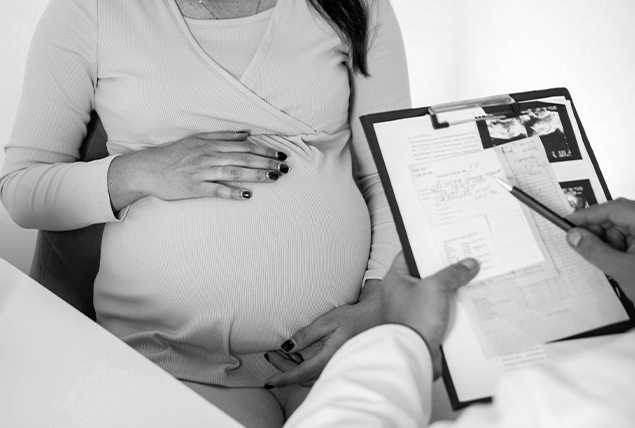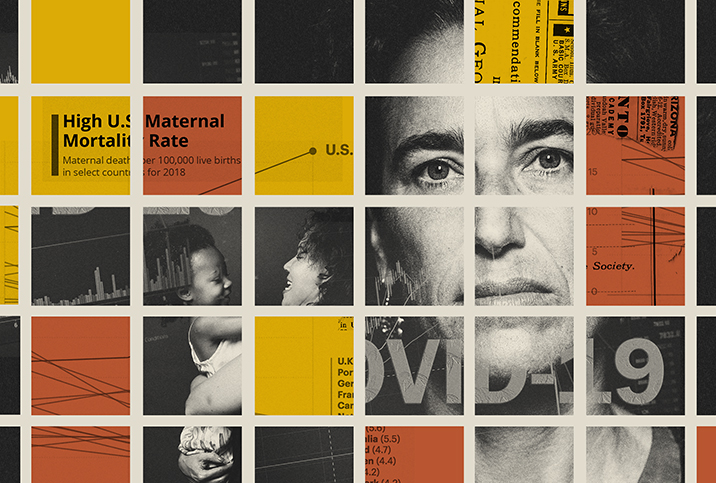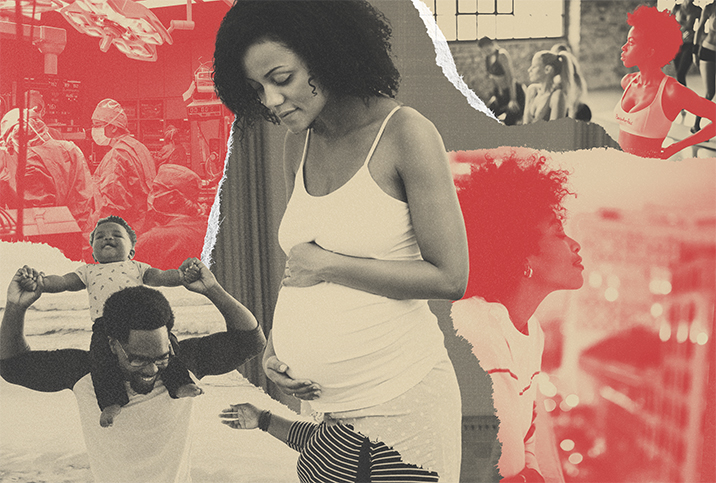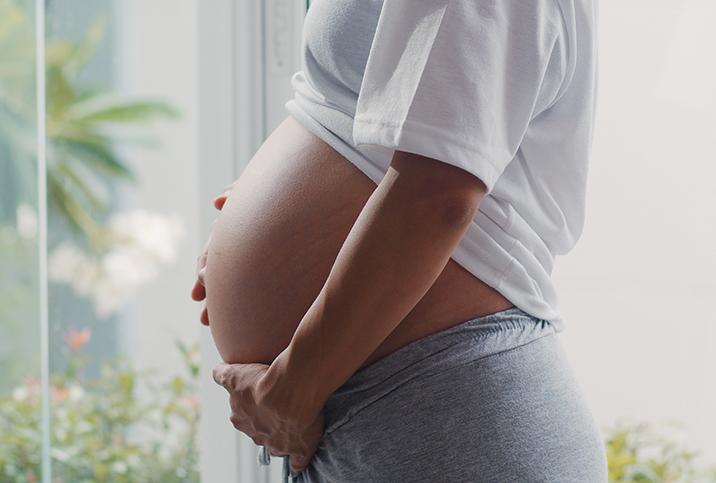Can Pregnancy Complications Raise Your Risk of Death Later in Life?

Although pregnancy and childbirth can be magical, they can also adversely impact a person's health for months—or even decades post-delivery, particularly if complications arise.
These implications may include an increased risk of death in the 50 years postpartum for people who experience common complications of pregnancy, such as preeclampsia, gestational diabetes or preterm delivery, suggested a 2023 study.
What is the maternal mortality rate in the United States?
The rate of maternal mortality in the U.S., defined as death during pregnancy or within 42 days of its ending, has climbed steadily in recent years, according to the Centers for Disease Control and Prevention (CDC).
In 2021, 1,205 people died of pregnancy and childbirth-related causes compared to 861 in 2020 and 754 in 2019. Experts believe some of the surge is attributable to the pandemic.
But the country's maternal mortality rate has long been the highest of any industrialized nation. It's three times that of France and more than double those of Australia, the United Kingdom, Germany, Spain, Japan, Austria and Israel, according to the Organization for Economic Cooperation and Development (OECD).
The country's maternal mortality rate has long been the highest of any industrialized nation.
"The U.S. is facing a grim reality in maternal health," said David B. Nelson, M.D., associate professor and division chief of maternal-fetal medicine in the Department of Obstetrics and Gynecology at UT Southwestern Medical Center based at Parkland Hospital.
Here's a look at what the researchers found and what that means for pregnant women and their postpartum health.
What kind of data was collected for this study?
The study, led by researchers at the University of Pennsylvania, built upon previous research indicating pregnancy complications are associated with cardiovascular disease and earlier mortality by parsing out the links between those complications and "total and cause-specific mortality."
Published in the journal Circulation, this study is the first large, long-range investigation to assess the association between total and cause-specific mortality and pregnancy complications in a racially-inclusive cohort.
Much of the previous research had been on predominantly white participants, making it difficult to determine how outcomes varied by race.
Researchers collected data from more than 46,000 people who'd given birth at a dozen health centers in the U.S. between 1959 and 1966. They then looked at how many had died by 2016 (roughly 18,000), their cause of death and their pregnancy complications, if applicable.
They also evaluated differences in outcomes between Black and white participants.
What does the study say about pregnancy complications and poor maternal health?
Pregnant women who had a preterm birth had a 7 percent increase in the risk of death compared to those who carried to full term, according to the study. Those whose water broke preterm had a 23 percent increased risk of death.
Women who were induced preterm had a 31 percent higher risk of death, and those who had preterm cesarean deliveries had a 109 percent increased risk compared to those who had not.
Researchers also found hypertensive disorders related to pregnancy, specifically, were associated with a 9 percent increase in all-cause mortality, while people who had high blood pressure before pregnancy and developed preeclampsia were 32 percent more likely to die of all causes, but most often cardiovascular disease.
Moreover, the study indicated gestational diabetes or high blood sugar during pregnancy increased the risk of death 50 years postpartum by 14 percent.
Pregnant patients are directed towards them significant medical resources, though their obstetric risks are already dictated in part by their prior health.
In line with previous research, the study also found maternal mortality disproportionately affects Black people. Among study participants, the death rate was 41 percent for Black people versus 37 for white patients.
The rate of preterm delivery was also higher, at 20 percent and 9 percent for Black and white participants, respectively. Black participants were three times more likely to have superimposed preeclampsia or eclampsia during pregnancy.
Although many aspects of pregnancy and childbirth have changed in the past 50 years, study authors and other experts say the findings reinforce the importance of investing in preventative and long-term care for pregnant women, particularly those in high-risk groups.
Why is the maternal mortality rate so high in the U.S.?
In large part, experts believe the nation's maternal mortality and morbidity rates reflect the poor health of Americans in general, a subpar healthcare system, systematic biases and economic and racial disparities.
"There is unfortunately not a singular, simple answer though broadly, pregnant outcome measures, including sadly mortality, are strongly tied to the health of a country's general adult population at the time they conceive," said David N. Hackney, M.D., associate professor, Department of Reproductive Biology at Case Western Reserve University School of Medicine in Cleveland.
It isn't one thing affecting maternal mortality, but several factors.
"If the general adult population has high levels of obesity, poverty, stress, diabetes and underlying cardiovascular disease, then the pregnant population will as well. When patients become pregnant, we often direct towards them significant medical resources, though often their obstetric risks are already dictated in part by their prior health," Hackney said.
Some people are not insured and can only qualify for Medicaid once they are pregnant, at which point their underlying health conditions are potentially much more dangerous and difficult to manage.
Why are Black mothers disproportionately affected?
Among the general population, the Black maternal mortality in the U.S. is three to four times higher than that for white people, said Ashanda Saint Jean, M.D., Chair of the Department of Obstetrics and Gynecology at HealthAlliance Hospital in Kingston, New York.
That rate remains constant when adjusting for income, insurance type, education and other socio-economic factors, as outlined in a 2022 report by the National Bureau of Economic Research.
"This racial disparity in maternal health is attributed to racism," Saint Jean said. "It is systemic, structural, and interpersonal racism that has contributed to this astounding rate of maternal mortality for Black birthing people."
For example, Saint Jean said, systemic and structural racism has impacted healthcare delivery in such a way as to contribute to higher rates of complications, including preterm delivery.
Similarly, redlining, lack of health care coverage and access and social determinants of health have contributed to disparities, as has lack of representation in medical studies and medical mistrust fueled by events like the "Mississippi appendectomies" and the Syphilis Study at Tuskegee, Saint Jean said.
Why are preterm labor and delivery associated with mortality risk?
Preterm labor and delivery occur before 37 weeks of gestation based on the obstetric estimate, according to the World Health Organization (WHO). Experts said it's unclear whether premature birth directly increases mortality risk. But the complications are associated with several factors.
With spontaneous preterm labor and delivery, Saint Jean said, infection is the most common cause. Because pregnant people are immune-compromised, infections of any origin are more likely to enter the bloodstream (bacteremia) or affect multiple organs (sepsis), both of which can be life-threatening.
Additionally, because cesarean deliveries involve invasive surgery, patients can be vulnerable to infections after the baby is born.
Other factors that can contribute to preterm labor and delivery include hypertensive disorders like preeclampsia, diabetes and stress, said Nelson, Hackney and Angela Burgess, M.D., an assistant professor and maternal-fetal medicine physician at UTHealth Houston.
What are the long-term risks of hypertensive disorders in pregnancy?
"Chronic hypertension is a risk factor for preeclampsia and eclampsia, and both can increase mortality and morbidity. Unfortunately, many only discover they have chronic hypertension during the course of prenatal care, and many only have insurance during their pregnancy," Saint Jean said.
That's not all. "Overall, there is a large percentage of pregnant and birthing people who are unaware and untreated for this chronic condition and unaware how it may impact their pregnancy and birth outcome," Sain Jean said.
About 50 percent of women with pregnancy-induced hypertension will develop chronic hypertension.
Hypertension and diabetes lasting beyond six weeks postpartum are considered chronic conditions unrelated to pregnancy, Hackney said. However, experts said people who develop pregnancy-related hypertension that resolves postpartum are typically predisposed and more susceptible to developing chronic illness later.
"Pregnancy-related hypertension is a precursor to chronic hypertension. About 50 percent of women with pregnancy-induced hypertension will develop chronic hypertension," Burgess said.
Importantly, experts said, hypertensive disorders can also contribute to cardiovascular disease, a leading cause of maternal mortality the year after birth.
Does gestational diabetes go away? What are its lasting effects?
Gestational diabetes resolves during the third stage of labor after the placenta's delivery, Saint Jean said. However, people can still have impaired glucose tolerance postpartum, and gestational diabetes transitions to overt type 2 diabetes in about 50 percent of patients.
"Given that astounding statistic and impaired glycemic control and its impact on one's body, all contribute to the risk of death years after childbirth," Saint Jean said.
Many of the deaths observed in the study were associated with chronic type 2 diabetes, infection and kidney disease, researchers noted. But diabetes can also lead to heart disease and numerous other conditions, Burgess said.
What can pregnant people do to reduce their risk of complications?
Some factors are beyond pregnant people's control. Research suggests a strong link between social determinants of health (SDOH), or non-health factors influencing health outcomes, as defined by the WHO, and maternal mortality.
However, there are several measures you can take to maintain a healthy pregnancy, especially before conceiving.
"Often, during pregnancy itself, our management options are more constrained. For example, if a patient is significantly overweight, we do not want large degrees of weight loss during pregnancy," Hackney said.
It's better to focus on your health before pregnancy.
"The ideal strategy would be health optimization prior to conceiving and then after pregnancy ensuring that your primary care physicians are aware of any pregnancy complications and recognize their associations with future increased risks," Hackney said
Preventative steps, according to Saint Jean and Burgess, include:
- Partake in preconception counseling
- Manage chronic health conditions before trying to conceive
- Find a healthcare provider you trust and feel comfortable with
- Establish and utilize a support network, which can include a doula, midwife, family and friends
- Enroll in prenatal care immediately
- Optimize physical, mental and emotional health prior to and during pregnancy
- Attend childbirth classes
- Get a glucose tolerance screening early
- Buy a blood pressure cuff to catch early signs of preeclampsia or elevated blood pressure
- See your healthcare provider for routine healthcare maintenance and screenings
- Speak with a high-risk maternal-fetal medicine specialist to discuss any concerns, especially if you have a health condition or history of complications
If you've had complications, you may wonder how you can reduce maternal mortality. Experts said much of the same advice applies. Keep up with routine healthcare appointments like Pap tests and annual physicals, and maintain a healthy lifestyle.
The bottom line
"Pregnancy serves as a window to future health," Nelson said.
More research is needed to ascertain whether complications are causes of mortality or indicative of underlying, potentially life-threatening risks, said lead study author Hinkle in a press release.
However, considering about 84 percent of pregnancy deaths in 36 states between 2017-2019 were determined preventable by the CDC, it's clear more needs to be done.
Targeting healthcare disparities at the community level is one of the most efficient and effective ways to improve outcomes, Nelson said. But healthcare providers and patients can take action, too.
Primary care physicians often don't look closely at a patient's pregnancy outcomes, as it may not be their area of expertise, Hackney said. But hopefully, studies like this will continue to reinforce the importance of doing so.
On an individual level, he said, it's also easy for parents to deprioritize their own health and well-being.
"People will often put their children first. However, in the long game, those same children will need you to remain alive and well, and if your pregnancy was complicated, you have all the more need to remain engaged in our healthcare system."


















